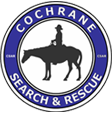Cochrane Search and Rescue (also known as Cochrane SAR, or simply CSAR), was formed in 2001 to provide the region with a group of volunteers trained in Ground SAR. Cochrane SAR now has approximately seventy-five members, and is based in Cochrane, a town about 40 kilometres north-west of Calgary, Alberta, Canada.
Cochrane Search and Rescue Association’s Service Area
CSAR is the primary SAR group to the north west of Calgary. On larger searches, SAR groups from the surrounding areas will assist CSAR, just as CSAR regularly assists these other groups. Standardized training and regular joint training exercises ensure that teams from all parts of Alberta work together without difficulty.
Cochrane SAR’S Obligations
CSAR will provide or facilitate relevant training for members, establish an effective organization for search and rescue, maintain a resource library, and supply specialized equipment.
Members Obligations
Members are expected to supply their own basic gear, attend monthly meetings and training, and actively participate in CSAR activities. The obligations are out-lined in our members’ policy. (Currently being updated)
SAR Overview – What is Search and Rescue
Search and Rescue (SAR) is about finding a lost person and removing them to a safe location.
There are two broad categories of SAR: marine and land. While the basic SAR function has been around for a long time, the need for better search results in the marine environment during WWII led to the development of formalized search methods that can be applied to land searches. Later developments have improved training and preparation for the deployment of skilled civilian searchers in a variety of operational circumstances on land and water near their communities.
The front line of SAR is the professional fire, police, medical, and military. Civilian SAR provides additional resources to the professionals when the size of the search exceeds the capacity of the professionals. SAR uses a command-and-control model of organization during search operations, while civilian training groups are conducted as a non-profit association with leadership and committees dependent on an active membership.
Civilian SAR encompasses many disciplines, for example: wilderness, urban, mountain, caves, swift water, avalanche, etc. Most civilian SAR groups offer a subset of the overall set of SAR disciplines.
CSAR trains for wilderness and urban ground search. CSAR members may be available for service year round, in all weather, day or night. In addition to searching for lost persons, CSAR also engages in evidence searches as directed by law enforcement. CSAR conducts an average of 6 search operations per year. Civilian volunteers are expected to coordinate activities with professionals, and therefore have a high standard of training. Civilian SAR groups work semi-independently as a team at the direction of professional authorities. Civilian SAR is a community service that requires a substantial commitment and has the potential to yield great personal satisfaction for a job well done.
